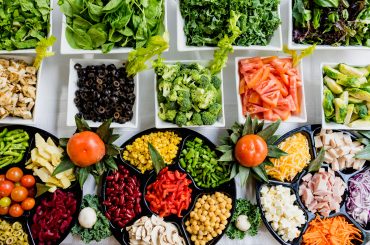Chronic fatigue syndrome (CFS), also known as myalgic encephalomyelitis (ME), is a mysterious disorder that affects a significant number of people worldwide. According to a rough estimation of the American Myalgic Encephalomyelitis and Chronic Fatigue Syndrome Society, there might be as many as 17-24 million people suffering from CFS/ME today.
This condition is hard to diagnose as there are no lab tests specific to CFS, and its causes are virtually unknown. Sufferers experience a variety of symptoms such as constant and overwhelming tiredness, sleep problems, muscle pain, flu-like symptoms, poor memory and concentration, headaches, as well as digestive issues like food intolerances and irritable bowel.
Sustained diet changes can help you manage the symptoms of CFS and improve your overall health. Eating a variety of foods with high nutritional value from different food groups key.
The list that follows, while not exhaustive, provides a few suggestions to get you started.
Whole Grains
When buying grain products, make sure you pick the unrefined ones since they have the most to offer. They are rich in complex carbohydrates as well as fiber, which Supports digestive health and can assist in weight management. Patients with CFS often experience substantial Weight loss or gain, so regular whole grain consumption can help them maintain healthy weight. Whole grains are also great sources of vitamins, minerals, and phytochemicals with extensive antioxidant activity. There is a lot to choose from: unrefined grain flours, barley, brown rice, oats, quinoa, buckwheat, and millet are a few examples.
Leafy Greens
No healthy meal plan is complete without the indusion of at least some dark green vegetables, like broccoli, spinach, kale, swiss chard, romaine lettuce, cabbage, and bok choy. They are high in vitamins A, K, and C. Furthermore, they are rich in minerals and antioxidant compounds that can fight off free radicals and prevent cell damage. They contain special chemical compounds called glucosinolates, which are known for their anti-cancer activity.
Eating a few servings of these nutritional powerhouses every day will make you feel healthier and more energized.
Eggs
Once notorious for their high cholesterol content, eggs are slowly restored in the public’s eyes as an inexpensive source of many nutrients. They contain zinc, energy-boosting iron, and they are also very beneficial to the brain because of their choline content. This compound aids fat metabolism, improves memory, and can even repair some types of neurological damage. Eggs are also a good source of vitamin B12, which promotes proper nerve function, and E, which maintains muscles and red blood cells. What’s more, egg yolks are a source of vitamin D, a nutrient that boosts immunity and protects against heart disease. Eggs are also very eye-friendly and a source of complete protein.
Fish
No one can deny that fish is one of the best things you can eat. They are an excellent source of high-quality protein, vitamins, and minerals. What makes fish really special though is their omega-3 fatty acid content. Omega-35 can protect against heart disease, improve brain function and eye health, and even combat conditions like anxiety and depression. Research indicates that eating fish twice a week is the best way to benefit from this amazing food. Some fish are richer in fatty acids than others: herring. mackerel, salmon, tuna, bluefin, and whitefish, are some of your best options.
Oysters
Oysters and other shellfish can be a helpful addition to a well-balanced diet since they offer unique nutrient combinations. Oysters are the best food source of an important and rather hard to find essential mineral, zinc. They are rich in selenium, a nutrient linked to lower risk of cancer, and they contain iron as well as vitamin B12.
These two nutrients can prevent deficiencies that lead to anemia. Moreover, oysters are a good source of iodine. which promotes normal cell metabolisms and can boost thyroid health. Unfortunately, all shellfish are highly allergenic, which means that people with food allergies cannot benefit from their superb nutritional content.
Nuts
When looking for a quick but healthy snack, nuts are one of vour best options. Thev are particularly rich in vitamin E. A helpful nutrient for blood sugar control and diabetes prevention. Their high potassium content contributes to cardiovascular health by lowering blood pressure. Nuits also contain important nutrients that can help you lower “bad” cholesterol levels, and they are rich in cancer-fighting antioxidants. However, the best thing about nuts is that they’re a “slow-burning” food. Such foods fuel your body with sustained energy for longer, thanks to the combination of fat, protein, and low carbohydrate levels.
Try eating small amounts of your favorite nuts several times a week.
Irene Bembry
Melons
Melons are great, but not just because they are full of water and keep you hydrated on those hot summer days. They are a fantastic source of many important nutrients, including vitamin A in the form of beta-carotene, vitamin C, and heart-promoting potassium. They are also rich in antioxidants (carotenoids and bioflavonoids), which play a crucial part in preventing many diseases, including cancer. The brightly-colored yellow varieties, such as cantaloupe, are more advantageous in that regard. Melons are also rich in fiber and low in calories, so they are the perfect fruit for weight management as well.
Kiwis
Once quite exotic, kiwis are now much more easy to find in grocery stores all year round. That’s excellent news since kiwis are delicious and valuable nutritionally. They are an excellent source of vitamin C, one of the world’s most powerful antioxidants, an immunity booster, and a respiratory health promoter.





